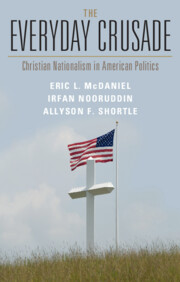Book contents
- The Everyday Crusade
- The Everyday Crusade
- Copyright page
- Dedication
- Contents
- Figures
- Tables
- Preface
- Acknowledgments
- Introduction
- 1 Myths, Gods, and Nations
- 2 Who Are the Believers?
- 3 Who Dwells in His House?
- 4 What Do We Owe Strangers?
- 5 Evangelizing American Religious Exceptionalism
- 6 Governing the Temple
- 7 The View from the Back Pews
- Conclusion
- Appendix
- Notes
- References
- Index
1 - Myths, Gods, and Nations
Published online by Cambridge University Press: 28 April 2022
- The Everyday Crusade
- The Everyday Crusade
- Copyright page
- Dedication
- Contents
- Figures
- Tables
- Preface
- Acknowledgments
- Introduction
- 1 Myths, Gods, and Nations
- 2 Who Are the Believers?
- 3 Who Dwells in His House?
- 4 What Do We Owe Strangers?
- 5 Evangelizing American Religious Exceptionalism
- 6 Governing the Temple
- 7 The View from the Back Pews
- Conclusion
- Appendix
- Notes
- References
- Index
Summary
Chapter 1 frames the main empirical question of The Everyday Crusade. By explaining the importance of myth in nation-making and the role of these myths in establishing American nationalism, this chapter explores how the religiously nationalistic ideology of American religious exceptionalism developed and embedded itself in American political and social culture. The authors delineate the ideology’s rich history and its link to restrictive and illiberal attitudes. This chapter reveals the power and persistence of national origin myths, their linkage to ideas about the specialness of America, and how over time they become a banal part of everyday American society.
Keywords
Information
- Type
- Chapter
- Information
- The Everyday CrusadeChristian Nationalism in American Politics, pp. 13 - 38Publisher: Cambridge University PressPrint publication year: 2022
